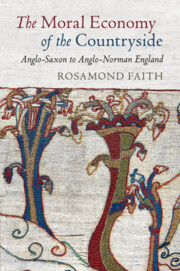Book contents
- Reviews
- The Moral Economy of the Countryside
- The Moral Economy of the Countryside
- Copyright page
- Contents
- Preface
- Abbreviations
- 1 Introduction: The Moral Economy
- Part I Rank
- Part II Reciprocity
- Part III Reputation and Witness
- Part IV The Wolf Sniffs the Wind
- Part V The Aftermath of Conquest
- 11 New Words in the Countryside
- 12 Narrating the New Social Order
- Part VI In the World of the Manor
- Appendix The Family Farm in Peasant Studies
- Bibliography
- Index
12 - Narrating the New Social Order
from Part V - The Aftermath of Conquest
Published online by Cambridge University Press: 25 October 2019
- Reviews
- The Moral Economy of the Countryside
- The Moral Economy of the Countryside
- Copyright page
- Contents
- Preface
- Abbreviations
- 1 Introduction: The Moral Economy
- Part I Rank
- Part II Reciprocity
- Part III Reputation and Witness
- Part IV The Wolf Sniffs the Wind
- Part V The Aftermath of Conquest
- 11 New Words in the Countryside
- 12 Narrating the New Social Order
- Part VI In the World of the Manor
- Appendix The Family Farm in Peasant Studies
- Bibliography
- Index
Summary
The first part of this chapter draws attention to some largely overlooked passages in the early twelfth-century legal compilation, Leis Willelme. This largely consists of Old English laws but contains some additions which were designed to remedy the deficiencies of those laws when it came to disciplining the peasantry. They would also, if put into effect, have considerably undermined the traditional system of vouching to warranty. The second part of the chapter describes a late twelfth-century view of how matters were settled between the newcomers and the indigenous landholders in the aftermath of the Conquest. Richard FitzNigel’s ‘Dialogue of the Exchequer’ describes a fractured process, one of negotiation and re-negotiation before ‘lawful agreements’ were arrived at, conveying ‘inviolable right’. That this became an accepted narrative, justifying e social relationships throughout society appears in Bracton’s doctrine of villeinage in the thirteenth century and that of the author of ‘the Mirror of Justices’ early in the fourteenth.
Keywords
- Type
- Chapter
- Information
- The Moral Economy of the CountrysideAnglo-Saxon to Anglo-Norman England, pp. 151 - 168Publisher: Cambridge University PressPrint publication year: 2019

